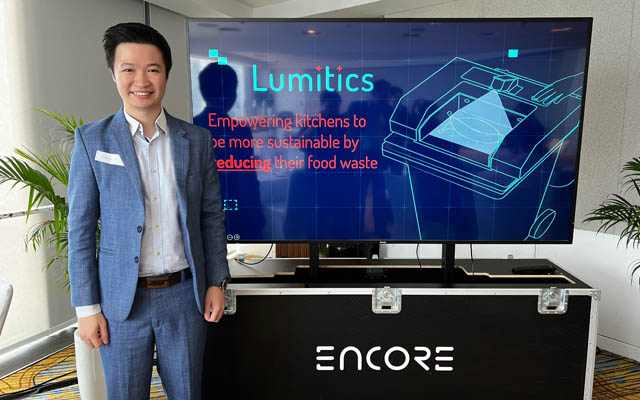Every year, about 1.6 billion tonnes of food worth US$1.2 trillion is wasted, which in turn generates 9.3 billion tonnes of carbon dioxide emissions.
One of the largest generators of food waste are buffet lines in the hospitality industry, and Rayner Loi, co-founder and CEO of Lumitics, is leveraging technology to bring about a higher level of insight to help businesses take actionable steps.

The Singapore-based start-up, backed by venture capital firm Velocity Ventures, has developed a smart waste tracker that uses artificial intelligence to track and identify the amount of food wasted. It uses a variety of sensors and computer vision to identify the item about to be thrown away.
This information is fed into a platform which is then presented in tables, highlighting areas of opportunity to trim portions down, and showing if a particular dish is slow moving and should be replaced by something else more popular.
“Visibility drives change, and visually after six months, the Fairmont team (one of Lumitics’ partners) was already throwing less away by tracking the leftovers from the daily buffet line. The team then adjusts the amount for future breakfast buffets,” said Loi.
Beyond hotels, this technology can also help reduce food waste on buffets onboard cruise ships, and airlines to achieve “precise catering”, he said.
When asked about the possibility of replacing buffets with cook-upon-order requests, Loi told TTG Asia: “I have posed the same question to some of our partners. But we have to understand that for the hospitality industry, labour is one of its biggest challenges. Running a buffet is advantageous, as you don’t need staff to take orders. QR ordering also doesn’t quite work, as staff will still need to serve guests. So, I think buffets are not going away.”
Aside from being labour intensive, buffets allow guests to serve themselves immediately. This is especially useful for time-starved business travellers in the morning.
Other factors that consumers do not see is the operational challenge in having enough blast chiller space to handle food redistribution. This is because cooked food has a four-hour window, and to maintain the freshness, it needs to be blast-chilled before being recooked. This leaves the hotel with lesser space for food preparation for an upcoming event or dinner service.
As for donating leftover food, Loi pointed out that although charities and organisations in Singapore want to donate food, there is no “legal environment that supports that type of goodwill”.
He explained: “We do not have a Good Samaritan Act, and local companies are fearful of legal liability. In other parts of the world like the US and Europe, the Act absolves the donor of any legal liability resulting from goodwill. Until that changes, retailers will try to minimise as much food waste as possible.”
Loi has been in touch with a few ministers about the goodwill act, and according to him, it will be tabled in parliament sometime later this year.
One solution that would be more suitable for Singapore’s context, he opined, would be to turn food into energy or even fish feed. Turning it into compost would not help as Singapore is not an agricultural nation.
He noted: “It’s not that these hotels don’t care – they are making commitments to reduce food waste. What they are doing is trying to make the best out of the situation. The reality is that there’s going to be food that cannot be reduced, but the bigger the hotel chain, the larger impact (on the reduction of food waste) there will be.”




















